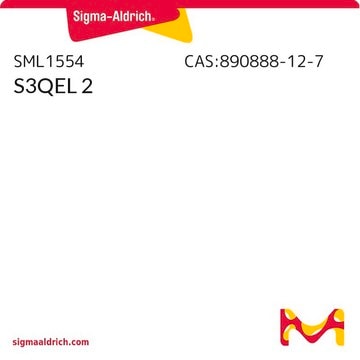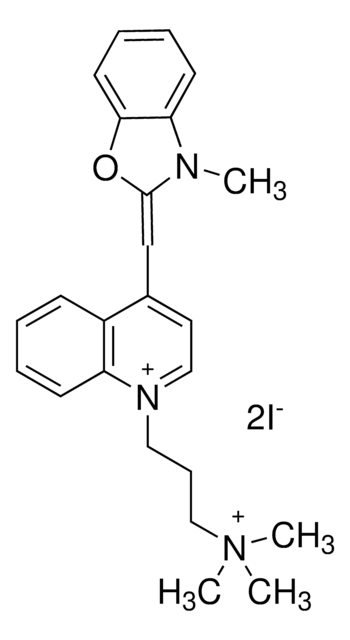SML1948
S1QEL1.1
≥98% (HPLC)
Sinónimos:
N1-(3-acetamidophenyl)-N2-(2-(4-methyl-2-(p-tolyl)thiazol-5-yl)ethyl)oxalamide, S1QEL
About This Item
Productos recomendados
Quality Level
assay
≥98% (HPLC)
form
powder
color
white to beige
solubility
DMSO: 2 mg/mL, clear
shipped in
wet ice
storage temp.
−20°C
SMILES string
CC1=C(CCNC(C(NC2=CC=CC(NC(C)=O)=C2)=O)=O)SC(C3=CC=C(C)C=C3)=N1
InChI
1S/C23H24N4O3S/c1-14-7-9-17(10-8-14)23-25-15(2)20(31-23)11-12-24-21(29)22(30)27-19-6-4-5-18(13-19)26-16(3)28/h4-10,13H,11-12H2,1-3H3,(H,24,29)(H,26,28)(H,27,30)
InChI key
BFNBJUBXXJKBFN-UHFFFAOYSA-N
Application
- to investigate the role of mitochondrial-derived superoxide in triggering ferroptosis
- to study the mechanism involved in the regulation of anti-fungal responses of macrophages against Aspergillus infection
- in combination with mito-antioxidant to study their influence on mitochondria-derived H2O2 in cancer cells
- to determine the effect of oxidative stress depletion on myoblast differentiation
Biochem/physiol Actions
Storage Class
11 - Combustible Solids
wgk_germany
WGK 3
flash_point_f
Not applicable
flash_point_c
Not applicable
Elija entre una de las versiones más recientes:
Certificados de análisis (COA)
¿No ve la versión correcta?
Si necesita una versión concreta, puede buscar un certificado específico por el número de lote.
¿Ya tiene este producto?
Encuentre la documentación para los productos que ha comprado recientemente en la Biblioteca de documentos.
Nuestro equipo de científicos tiene experiencia en todas las áreas de investigación: Ciencias de la vida, Ciencia de los materiales, Síntesis química, Cromatografía, Analítica y muchas otras.
Póngase en contacto con el Servicio técnico








